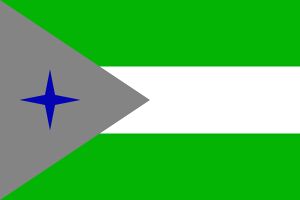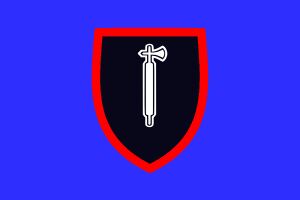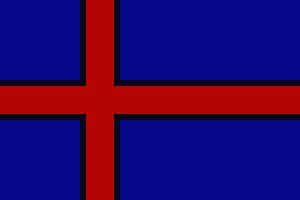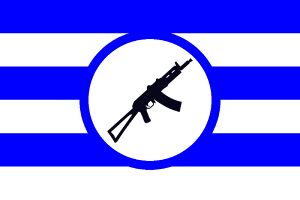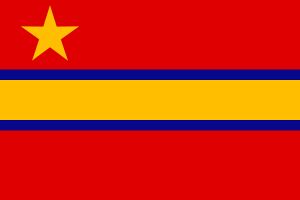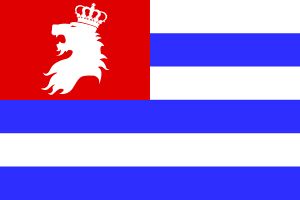Malorian Islands
The Federation of Malorian Islands La Fédération Des Iles Maloriennes | |
|---|---|
| Motto: Patrie, Dieu, Democratie | |
| Anthem: "Forward, Maloria" National Anthem of The Federation of the Malorian Islands | |
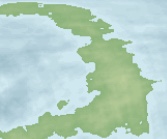 | |
| Capital | Bordeaux |
| Largest | St. Bernard |
| Official languages | French, English |
| Recognised national languages | French, English |
| Recognised regional languages | Spanish, Haitian Creole, Runglish, Low German |
| Ethnic groups (2019) | White (82%), Black (13%), Asian (2.5%), Hispanic (2.5%) |
| Demonym(s) | Malorianese |
| Government | Federal presidential republic |
• President | Frank A. Perry |
• Prime Minister | John Moreau |
| Legislature | The Council of The Republic |
| The National Senate | |
| The House of Representatives | |
| Foundation Independence from France (July 9th, 1910) | |
• Monarchy established | October 9th, 1953 |
• Military junta established | September 30th, 1993 |
• Monarchy abolished | January 11th, 1997 |
• Military junta abolished | August 19th, 2011 |
• Current Constitution | October 5th, 2018 |
| Area | |
• | 750 km2 (290 sq mi) |
• Water (%) | 1.6 |
| Population | |
• 2019 estimate | 100,000 |
• 2019 census | 102,256 |
• Density | 105/km2 (271.9/sq mi) |
| GDP (nominal) | 2019 estimate |
• Total | M221,000,000,000 |
• Per capita | M26,211 |
| Gini | 29 low |
| HDI (2019) | 0.9824 very high |
| Currency | Malorianese Mark (MM) |
| Time zone | UTC-4 (Malorian Islands Time) |
| Date format | mm-dd-yy |
| Driving side | left |
| Calling code | +503 |
| ISO 3166 code | MAL |
The Federation of Malorian Islands or simply The Malorian Islands, is a country in the northeastern Caribbean. It shares waters with Haiti, The Dominican Republic, and Cuba. The Malorian Islands was originally a colony of the French Empire until 1910, when eventually given independence by the French Third Republic in 1910. In 1942, The Malorian Islands was occupied by the French State and Nazi Germany during World War II before the puppet government was overthrown in 1945. In 1953, the Malorian Islands became an absolute monarchy led by King Quentin Farcoise after overthrowing leftist President of the Malorian Islands President Evan Gonzales. In 1993, the monarchy was de facto abolished in favor of a military junta led by anti-monarchist factions of the Malorianese Royal Army after King Quentin Farcoise died in 1989. Since the adoption of a democratic constituition in 2011, the Malorian Islands has functioned as a federal presidential republic.
Etymology
The name for the country Maloria comes from a Spanish word meaning angelic or graceful. Is is believed by ancient historians that the name Maloria was used by Italian explorer Christopher Columbus when describing the Malorian Islands to his colleagues. The Malorian Islands was known by many names throughout history, including but not limited to La Terre du Lions when under French rule and Isla de Angelica under Spanish rule.
History
| Part of a series on the History of the Malorian Islands |
| Historic periods of the Malorian Islands |
|---|
| Spanish colonialism of the Malorian Islands |
| 1553 - 1812 |
| French colonialism of the Malorian Islands |
| 1812 – 1910 |
| First Republic of the Malorian Islands |
| 1910 – 1942 |
| Axis occupation of the Malorian Islands |
| 1942 – 1945 |
| The Government of the Republic of the Malorian Islands in exile |
| 1942 – 1945 |
| The Second Republic of Malorian Islands |
| 1945 – 1947 |
| The People's Federal Republic of Malorian Islands |
| 1947 – 1953 |
| The Kingdom of Malorian Islands |
| 1953 – 1997 |
| The Third Republic of Malorian Islands |
| 1997 – 2018 |
| The Federation of Malorian Islands |
| 2018 – |
Pre-Independent Malorian Islands (1553-1910)
Prior to 1910, The Malorian Islands was under the rule of the Spanish Empire from 1553 to 1812 and under French rule from 1815 to 1910. The region was seen as very important to both nations, as the nation was rich in sugar and bananas. The Spanish Empire first held the Malorian Islands as Isla de Angelica after it was first explored by Italian colonist and explorer Christopher Columbus. In 1812, the Second French Empire under Napoleon III conquered the Spanish Empire within Isla de Angelica, eventually kicking them out of the region and renaming the islands to La Terre Du Lions.
The Malorianese Revolutionary War (1907-1910)
In 1907, La Terre Du Lions went to war with the French Third Republic over its level of autonomy within France during the Malorianese Revolutionary War. From 1907 until July 9th, 1910, the provisional government of the Malorian Islands was established to form a temporary government and to fight France. The former governor of La Terre Du Lions, Malik Dubois, became the head of state of the provisional government on February 8th, 1907. On July 9th, 1910, the Treaty of St. Bernard was signed and a referendum was officially held to determine if the Malorian Islands wished to continue as an autonomous region of the French Third Republic or to be an independent nation. The referendum was held with the majority of voters wishing to be an independent nation. The former colony island known as La Terre Du Lions then formed the Republic of The Malorian Islands with Dubois becoming the first President of the Republic.
The First Republic of the Malorian Islands (1910-1942)
Reforms under President Dubois
After independence was made by the Republic of the Malorian Islands, President Dubois pushed reforms within the country to improve the nation's economy from a purely agricultural economy into a partially agricultural economy. Dubois made these reforms through a visa policy that encouraged entrepreneurs, industrialists, and workers to immigrate to the Malorian Islands. This policy enacted by the Dubois Administration was successful short term, but affected the nation long term.
Foreign Relations of the First Republic of the Malorian Islands
Under the Dubois Presidency, he embraced a policy of isolationism and neutrality throughout World War I and the beginning of World War II. Striving for a "Maloria First" policy of domestic and foreign policy, his government and the Malorian Islands focused on the affairs of its citizens rather than get involved with the affairs of other nations.
Interwar Period (1933-1942)
The LeMonde Administration
President Dubois died in office on March 3rd, 1933 with then-Vice President Veronique LeMonde becoming President of the Republic. LeMonde led the nation, ensuring the economy did not suffer nor improved through minor government intervention. Under the LeMonde Administration, President LeMonde also improved ties with the United States under President Franklin Roosevelt and the United Kingdom.
Invasion of The Malorian Islands
On June 25th, 1940 Nazi Germany invaded and conquered the former French Third Republic. While LeMonde did not acknowledge the threat of both Nazi Germany and the newly established puppet state the French State at first, the LeMonde Administration began conscription on November 12th, 1940 to build the Malorianese National Guard. This did not stop Nazi Germany and the French State. On December 6th, 1942, Nazi Germany and the French State invaded the Malorian Islands. The invading Nazi and French forces captured St. Bernard and overthrew President LeMonde on December 9th, 1942.
The Malorianese Republic (1942-1945)
The Malorianese Republic, established and installed by both Nazi Germany and the French State, was a puppet state led by Oberst Heinrich Laissez. Oberst Laissez, as the de facto Malorianese head of state, set new laws that were in similarity to the National Socialist model Nazi Germany was promoting. All political parties, excluding the Malorianese Renaissance Party, were banned. Those that were deemed to be political threats and/or "undesirables" to the newly established regime were to be either sent to Germany to face a punishment of hard labor within Nazi Germany's many concentration camps or were executed outright by the Malorianese National Police. While Patron Laissez ruled the Malorian Islands as a dictator, resistance pipelines were already forming. The Malorianese Popular Front, a left-wing Marxist-Leninist rebel army formed in 1936 to combat the social democratic government of LeMonde, temporarily ended its policy of class warfare in favor of working with other resistance groups within the Malorian Islands. This included the Free Malorian Army and the Malorianese National Guard-in exile.
Foreign Relations of the Malorianese Republic
The fascist puppet state had foreign relations only with nations that officially recognized it. These nations included the French State, Nazi Germany, the Kingdom of Italy, the Empire of Japan, and other Axis Powers nations. Laissez, as head of state of the Malorian Islands under Axis occupation, adopted the term "Le Patron" (meaning boss in French) to identify his new leadership role as the head of state of the Malorian Islands.
The End of The Malorianese Republic
On August 12th, 1945, the dictator of the Malorianese Republic was assassinated by the Malorianese Resistance (with assistance from both the OSS and the NKVD). Patron Laissez was assassinated by car bomb at approximately 12:05 PM Malorian Islands time after making a speech atop the balcony of the Republican Palace. After his assassination, some remnants of the German Army that weren't yet recalled back to Germany attempted to maintain control of the Malorianese Republic.
The Malorianese Government-in-exile (1942-1945)
After the Malorian Islands were invaded by the Axis Powers, President LeMonde seeked asylum in neutral Costa Rica as a way to "coup-proof" her government-in-exile as well as to maintain nations with both nations within the Allies and the Comintern such as the Second Spanish Republic government-in-exile and the USSR.
Foreign Relations of the Malorianese Government-in-exile
She furthered foreign relations with Allied nations such as the United States, the United Kingdom, the French government-in-exile, and the Soviet Union. As President-in-exile she formed her own cabinet consisting of former staff under President Dubois as well as her own administration. With help from the United Kingdom, she was also able to form the Malorianese National Guard-in exile as a resistance movement against the fascist government within the Malorian Islands.
End of WWII In The Malorian Islands
The failed effort to maintain a fascist state within the Caribbean was foiled through the efforts of Allied forces on September 7th, 1945 during Operation Gadsden. The invasion of the Malorian Islands overthrew the fascist dicatorship, abolishing both the fascist government and the Malorianese Renaissance Party as well. President LeMonde was allowed to return two days after the invasion to continue her duties as the President of the Republic.
Post-war Period (1945-1947)
The Second Republic of the Malorian Islands (1945-1947)
After the end of World War II, the country faced near economic collapse as the economy was weakened due to France and Germany took advantage of the Malorian Islands' national goods and supplies. LeMonde and her social democratic government failed to successfully implement economic and social reforms that would've fixed the issues that were facing the Malorian Islands as of 1947.
The Malorianese Civil War (1945-1948)
The failed economic and social reforms of the LeMonde government forced the left-wing rebel group, the Malorianese Popular Front, to re-form under the leadership of Evan Gonzales. The Marxist rebel leader and his army, supported by the Soviet Union and Yugoslavia, fought the Malorianese National Guard aggressively between late 1945 and early 1947. LeMonde's government began to crack under pressure as some elements of the population rioted against the government in Freedom Square within St. Bernard. Knowing that the end was near, LeMonde and her government invited the higher echelons of the Malorianese Popular Front to peace talks between the rebel group and the LeMonde government with the end result being the eventual MPF's introduction into the Council of the Republic before eventually seizing power altogether on February 28th, 1947. The coup d'etat against the LeMonde marked the end of the Second Republic of the Malorian Islands and the LeMonde Administration. Some sections of the Malorianese Armed Forces that were not loyal to Gonzales still fought against Gonzales' government as late as mid-1948 until a ceasefire was created to end the civil war.
The Collapse of the Second Republic of the Malorian Islands
In early 1947, LeMonde relinquished power and allowed Gonzales and the Malorianese Popular Front to take power in the Malorian Islands. LeMonde lived in seclusion after her fall from power, eventually dying in a small village not far from Bordeaux in 1956.
The People's Federal Republic of the Malorian Islands (1947-1953)
Gonzales' Rise to Power
On March 10th, 1947, the LeMonde Administration reached a compromise with the Malorian Popular Front, allowing Veronique LeMonde to step out of power and for Evan Gonzales to lead the Malorian Islands under a socialist government. To celebrate his accomplishment as President of the Republic of the Malorian Islands, he changed the name of the country to the People's Federal Republic of the Malorian Islands in an effort to legitimize his rule. This also meant changing the position of the head of state of the Malorian Islands from President to General Secretary of the Worker's Party.
Foreign Relations of the PFRMI
Under the rule of General Secretary Evan Gonzales, the Malorian Islands shifted its foreign relations from its western allies of the United States and the United Kingdom to the Soviet Union and the Warsaw Pact to reflect its commitment to the ideas of both world communism and Joseph Stalin's adaptation of the ideology of Marxism-Leninism. General Secretary Gonzales also gave foreign aid and support to the Communist Party of China and the Irish Republican Army whilst in office. In 1950, at the start of the Korean War, Gonzales officially had his government recognize and send aid to North Korea as part of his doctrine of "keeping friends close" in order to have an effective relationship with any nation that leaned anywhere close to the Soviet satellite of power.
Socialism in the Malorian Islands
Under the guise of the Worker's Party of the Malorian Islands, Gonzales implemented social reforms including the re-distribution of wealth, land reform, and the nationalization of the sugar and banana industries. Gonzales also implemented economic reforms to significantly change the economy from a purely agricultural to a mostly industrial economy. While these reforms were mostly successful, the way that Gonzales and the socialist government implemented these reforms was through strict quotas and a ideal plan for a Five Year Plan (from 1947 to 1952). These strict quotas made Gonzales and his government unpopular through time but any dissent or rumors of an uprising were quickly stomped out through the Comite Populaire Des Affaires Nationales et d'Etat (People's Committee on State and National Affairs; CPDANE), the political police of the Malorian Islands during the Gonzales Era.
The Malorian Islands were supported and propped up by the Soviet MGB and the East German Ministry for State Security in order to make the Malorianese secret police effective against any form of dissent towards the Marxist-Leninist regime. While as head of state, Gonzales began to develop a cult of personality around himself. He did this by glorifying the deeds of his pre-revolutionary activities as a humble socialist and leftist writer as well as skewing the media to have a strictly improved view of Gonzales. This was done by having any dissident journalists either imprisoned, assassinated clandestinely through the CPDANE, or just outright executed publicly.
Downfall of the People's Federal Republic of the Malorian Islands
By 1953, things were not going in Gonzales' favor. Stalin had died earlier in the year with his replacement being a less than favorable successor in the eyes of Gonzales, with Soviet and East German support withdrawn a week after Stalin's death. Gonzales had attempted to gather support from the People's Republic of Albania, only for it to fall through as Enver Hoxha did not see Gonzales as a "pure Marxist-Leninist", which resulted in the CPDANE weakining significantly due to a lack of support from the Soviet Union and the German Democratic Republic. Seeing an opportunity, the United States reached out to Quentin Farcoise indirectly through CIA liason Richard Bryson.
Farcoise, a Major within the Malorianese People's Army and pretender to the House of Bourbon, was annoyed with the current socialist government. Bryson and Farcoise secretly created a plan to overthrow the socialist government in favor of a dictatorship with US backing and recognition. On May 1st, 1953, Quentin Farcoise and three other military officers led the 51st Armored Tank Battalion, the 21st Infantry Battalion, and the Erich Mielke Special Regiment toward the Republican Parliament. Forcing Gonzales out of power, Gonzales surrendered to Farcoise's forces and fled the Malorian Islands to the People's Republic of Bulgaria, where he stayed in exile until his death in 1981.
The Kingdom of the Malorian Islands (1953-1997)
A New Government
With Gonzales and his Worker's Party of the Malorian Islands forcibly dissolved, Farcoise slowly consolidated power to ensure longevity within his government. Not long after he took power, Farcoise had the military officers that assisted in his rise to power secretly imprisoned without the knowledge of the public nor the CIA. This allowed for Farcoise to officially declare the Kingdom of the Malorian Islands on June 1st, 1953. Under King Quentin Farcoise, to embrace a newly established cult of personality, he moved the capital of the Malorian Islands from St. Bernard to Bordeaux, the birthplace of King Farcoise.
Foreign Relations of the Kingdom of the Malorian Islands
After the overthrow of Evan Gonzales in 1953, the Malorian Islands shifted its foreign relations from those of pro-communist states such as the Soviet Union and North Korea to its former allies such as the United States, the United Kingdom, France, and West Germany. Farcoise, a fervent nationalist, did maintain relations with nations that held beliefs similar to his. In 1967, after the overthrow of the King of Greece, King Farcoise was one of the first to recognize the newly established military government in Greece. The Kingdom of the Malorian Islands under King Quentin Farcoise also maintained relations with the Republic of Zaire during the Cold War, seeing then-President of Zaire Mobutu Sese Seko as a valuable ally within Africa against socialism and colonialism. The Malorian Islands did maintain relations with two communist countries under King Farcoise: The Socialist Republic of Romania under Nicolae Ceausescu and the SFR Yugoslavia under Marshal Josip Broz Tito seeing them as a "bulwark against Soviet-style Communism" The Kingdom of the Malorian Islands had embassies hosting Zaire, the United States, the United Kingdom, the French Fifth Republic, the Federal Republic of Germany, the Socialist Federal Republic of Yugoslavia, the Socialist Republic of Romania, The Republic of Zaire, and eventually the People's Republic of China and the Soviet Union after reforms were made. In 1992 under King Marco Farcoise, the Malorian Islands also recognized the breakaway states of the Pridnestrovian Moldavian Republic, the Republic of Abkhazia, the Republic of South Ossetia, as well as the newly established Russian Federation under President Boris Yeltsin.
Quentin Farcoise's Death and Downfall of the Kingdom
On November 10th, 1989 King Quentin Farcoise died at the age of 58. The official cause of death was asphyxiation, however, his cause of death is still up to opinion as of 2020. His official killer is also up to debate was well. It is commonly believed that he was poisoned at dinner by either his son Marco or Leopold DuPont, the Minister of Defense under King Farcoise. On November 22nd, 12 days after Quentin Farcoise had died, his son Marco Farcoise became the heir apparent to the throne. However, compared to his father, Marco did not take the position as seriously. Marco, as King of the Malorian Islands, delegated duties to those he "deemed fit" for the job. Meanwhile, Marco used his time to gamble, drink, and mingle in Bordeaux's casinos, bars, and brothels. It wasn't long until he angered the military. On February 9th 1993, after several cuts to the military budget to subsidize Marco's expenses and to strengthen the secret police, the Malorianese Royal Armed Forces staged a coup d'etat against the young King of the Malorian Islands. The coup was successful with General DuPont forming a military council to govern the nation. The Military Council on Unity and Stabilization was then formed a week later on February 16th, 1993.


